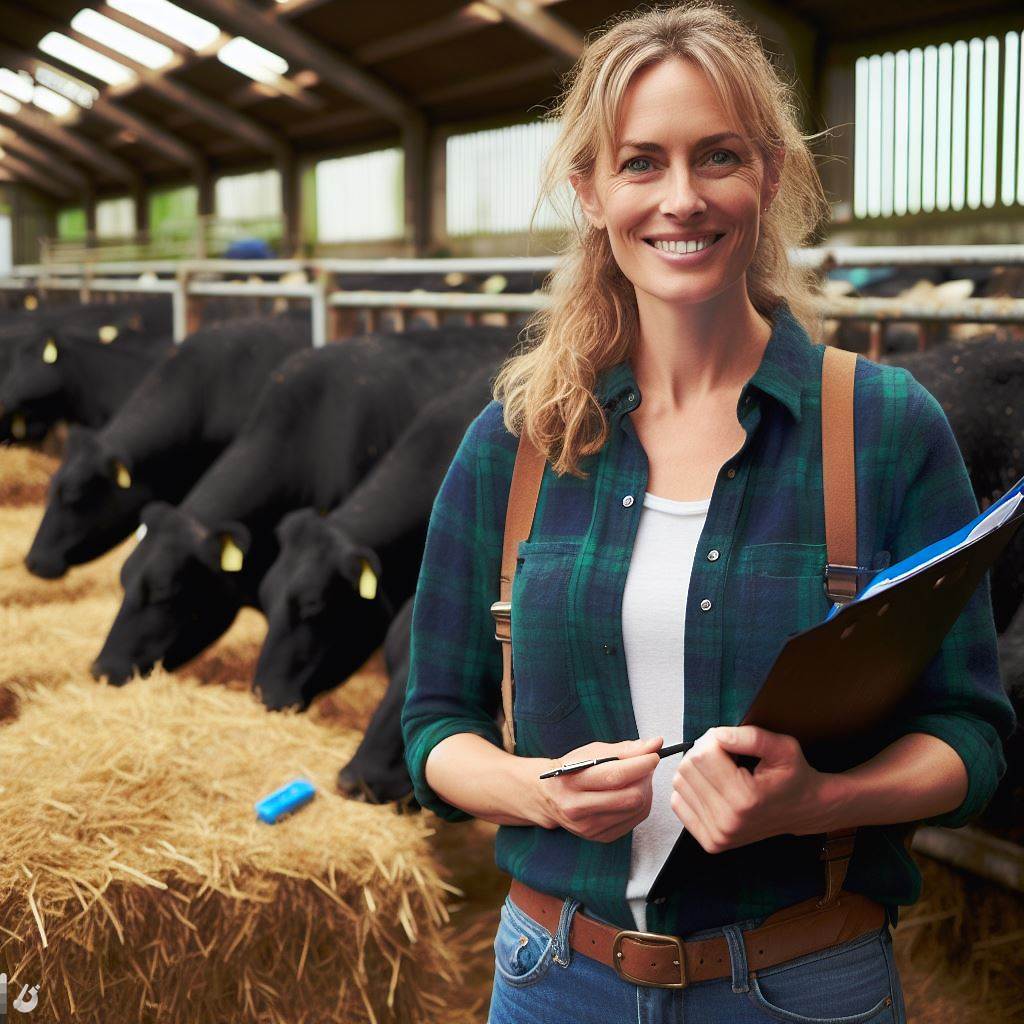Introduction
Organic Farming in the UK
- Thriving practice, growing steadily.
- Focus on natural processes, eco-friendly techniques.
Importance for Sustainable Agriculture
- Preserves soil health, biodiversity.
- Minimizes chemical inputs, promotes long-term sustainability.
Purpose of the Blog Post
Guide for UK Managers:
- Navigate organic farming intricacies.
- Optimize practices for sustainable yields.
- Foster eco-friendly agricultural management.
In this blog post, we embark on an insightful journey into the realm of organic farming in the UK.
Understanding its growth, significance in sustainable agriculture, and the essential guide it offers to managers will pave the way for a greener, healthier future in farming practices.
Understanding Organic Farming
Definition and principles of organic farming
- Organic farming is a holistic approach that focuses on sustainable agricultural practices.
- It relies on natural processes, biodiversity, and ecological cycles to maintain soil fertility.
- Principles of organic farming include minimizing environmental impact, promoting biodiversity, and avoiding synthetic pesticides.
- Organic farmers prioritize soil health, crop rotation, and natural pest management strategies.
- They aim to create a balanced ecosystem that supports long-term sustainability and healthy food production.
Key differences between organic and conventional farming methods
- Organic farming avoids synthetic chemicals, while conventional farming relies heavily on them.
- Conventional farming often involves genetically modified organisms (GMOs), but organic farming prohibits their use.
- Organic farming focuses on soil health, while conventional farming may prioritize high yields through intensive chemical applications.
- Conventional farming may use synthetic fertilizers, but organic farming relies on organic matter and natural nutrient cycling.
Certification and regulatory bodies for organic farming in the UK
- In the UK, organic farming is regulated by the Department for Environment, Food, and Rural Affairs (DEFRA).
- DEFRA ensures compliance with European Union regulations for organic farming.
- Organic farmers must undergo certification by an approved body to label their products as organic.
- The Soil Association is the largest organic certifier in the UK, setting high standards for organic farming practices.
- Other certifying bodies include Organic Farmers & Growers, Biodynamic Association, and the Organic Food Federation.
Benefits of Organic Farming
Environmental Benefits
- Slash synthetic pesticide and fertilizer use.
- Bolster soil conservation, nurturing biodiversity.
Health Benefits
- Diminish chemical residue exposure.
- Harness nutritional advantages from organic produce.
Economic Benefits
- Meet surging UK market demand for organics.
- Government incentives and steadfast support for organic farmers amplify economic viability.
In embracing organic farming, UK managers unlock a trove of advantages. Environ-mentally, the method champions reduced chemical reliance, fostering soil health and biodiversity.
Health-wise, it curtails exposure to harmful residues while enhancing nutritional quality.
Economically, the flourishing demand for organic products in the UK, coupled with government incentives, propels organic farming into a lucrative sphere.
This chapter delves into the multifaceted benefits that make organic farming not just a sustainable choice but a strategic one for managers steering agricultural practices toward a greener and economically robust future.
In essence, organic farming brings a range of benefits to UK managers and the broader society.
Its environmental benefits include reduced use of synthetic pesticides and fertilizers, as well as soil conservation and improved biodiversity.
Read: UK Fishing Ports: The Heart of Fishermen’s Lives
Challenges and Considerations
Transitioning to Organic Farming
Comprehend Conversion Timelines
- Embrace the patience required.
- Align practices with organic standards.
Tackling Yield Reductions
- Strategize to mitigate potential losses.
- Implement organic-friendly soil enhancements.
Pest and Disease Management
Embrace Biological Controls
- Integrate natural predators.
- Foster symbiotic relationships in the ecosystem.
Crop Rotation and Companion Planting
- Disrupt pest life cycles.
- Leverage companion plants for pest deterrence.
Market Challenges and Consumer Expectations
Navigating Organic Certification
- Comply with stringent organic standards.
- Secure official organic certification.
Meeting Ethical Consumer Demands
- Understand consumer expectations.
- Fulfill demand for ethically produced organic goods.
In the transition from conventional to organic farming, managers encounter multifaceted challenges.
Understanding conversion timelines, managing yield reductions, implementing effective pest and disease controls, and meeting market demands are integral components.
Embracing these challenges empowers managers to navigate the organic landscape successfully, ensuring a sustainable and ethical approach to farming in the UK.
Read: Aquatic Health Management by UK Experts
Discover More: Education Pathways for Aspiring Foresters
Implementing Organic Farming Practices
Soil management and fertility
- Understanding the importance of organic matter and the benefits of composting.
- Using cover crops and green manures to improve soil fertility and reduce erosion.
Crop rotation and diversification
- Exploring the benefits of rotating crops to enhance soil health and control pests naturally.
- Incorporating diverse crops and livestock for a sustainable and resilient farming system.
Pest and weed control strategies
- Implementing cultural and mechanical methods such as crop rotation and hand weeding.
- Resorting to organic-approved pesticides only as a last resort to protect crops.
Organic farming is more than just avoiding synthetic chemicals; it requires implementing specific practices to maintain soil health, enhance biodiversity, and minimize environmental impact.
In this chapter, we will delve into some key strategies for successful organic farming implementation.
Soil management and fertility
Importance of organic matter and composting
One of the fundamental aspects of organic farming is recognizing the significance of organic matter in soil.
Organic matter enriches the soil with essential nutrients, improves water retention, and promotes the growth of beneficial microorganisms.
Composting, the process of decomposing organic waste, is a valuable technique to create nutrient-rich compost that can be used as fertilizer.
By utilizing compost, farmers can enhance soil fertility in a sustainable and organic manner.
Utilizing cover crops and green manures
Cover crops and green manures are vital tools for organic farmers to maintain soil health. These crops are planted to cover the soil during fallow periods or between cash crops.
They protect the soil from erosion, enhance nutrient cycling, and suppress weed growth. Cover crops, such as legumes, also have the added benefit of fixing nitrogen, reducing the need for synthetic fertilizers.
By incorporating cover crops and green manures into their farming practices, UK managers can improve soil structure, fertility, and overall farm productivity.
Crop rotation and diversification
Benefits of rotating crops to improve soil health and pest control
Crop rotation is a time-tested practice that involves growing different crops in a specific sequence on the same piece of land. This technique breaks pest and disease cycles and helps maintain soil fertility.
Different crops have different nutrient requirements, and by rotating crops, farmers can prevent nutrient depletion and reduce the buildup of pests and diseases.
Additionally, crop rotation promotes biodiversity in the soil, leading to healthier plants and increased resilience against pests and climate variability.
Incorporating diverse crops and livestock for sustainable farming
Diversification is a key principle of organic farming. By incorporating a variety of crops and livestock, farmers minimize the risk associated with relying on a single crop or product.
Diverse crops not only contribute to enhanced pest control but also promote pollination, support beneficial insects, and provide a more balanced farm ecosystem.
Livestock integration, such as rotational grazing, can help improve soil fertility by recycling nutrients and improving soil structure.
Furthermore, diverse farms are more resilient to weather extremes and market fluctuations, ensuring economic stability for UK managers.
Pest and weed control strategies
Implementing cultural and mechanical control methods
Organic farming employs cultural and mechanical control methods to manage pests and weeds without relying on synthetic chemicals.
These methods include practices such as crop rotation, proper spacing, trap cropping, and physical barriers.
Cultivating healthy plants, maintaining balanced nutrient levels, and fostering beneficial insect populations can naturally suppress pests and reduce the need for chemical interventions.
Mechanical control involves hand weeding, mulching, and using specialized tools to physically remove weeds.
By utilizing these strategies, UK managers can maintain a pest-free environment while preserving the integrity of their organic system.
Using organic-approved pesticides as a last resort
While organic farming prioritizes natural pest control methods, there may be situations where additional intervention is necessary.
In such cases, organic-approved pesticides derived from natural substances can be used.
However, it is essential to consider them as a last resort due to the potential ecological impact and potential harm to beneficial organisms.
Strict adherence to organic regulations and proper pest monitoring are crucial to minimize the use of pesticides.
Integrated pest management practices, focusing on prevention and organic alternatives, should always be the primary approach in organic farming.
Personalized UK Career Consulting
Receive tailored career guidance designed just for you. Get actionable steps and expert support to boost your career in 1-3 days. Take control of your career now.
Get StartedBasically, implementing organic farming practices involves strategically managing soil, diversifying crops, and employing pest and weed control strategies.
UK managers cultivate sustainable farming by prioritizing soil fertility, employing crop rotation, and embracing cultural pest control for high-quality organic products and environmental protection.
Read: Aquaculture Equipment Essentials in the UK

Marketing and Selling Organic Products
Identifying target markets and customer preferences
- Conduct market research to identify potential target markets for organic products.
- Analyze consumer preferences and trends in order to tailor marketing strategies.
- Educate yourself on the specific needs and preferences of your target customers.
- Develop a marketing plan that focuses on reaching and engaging your target market.
- Utilize social media platforms to connect with and understand your target customers.
Packaging and labeling requirements for organic products
- Familiarize yourself with the regulations and guidelines for packaging organic products.
- Ensure your packaging materials are eco-friendly, sustainable, and aligned with organic principles.
- Label your organic products clearly, including necessary information such as certifications and ingredients.
- Design packaging that communicates the organic nature of your products effectively.
- Consider using recycled or recyclable packaging materials to further appeal to eco-conscious consumers.
Utilizing direct marketing channels and certification logos
- Utilize digital marketing techniques such as email campaigns and social media advertising.
- Collaborate with organic certification bodies to utilize their logos on your products for credibility.
- Participate in organic trade shows and events to showcase your products to potential customers.
- Explore partnerships with local retailers and online marketplaces to expand your reach.
- Offer discounts or promotions to incentivize customers to try your organic products.
In the competitive realm of organic farming, effective marketing is key to success. Identify your target markets, understand what consumers want, and tailor your products accordingly.
Ensure your packaging and labeling meet organic standards, using eco-friendly options when possible. Direct marketing through local farmers’ markets and online platforms can expand your reach.
Don’t forget to proudly display your certification logos, instilling confidence in consumers about the organic authenticity of your products.
This chapter delves into the intricacies of marketing and selling organic products, providing essential insights for UK managers seeking success in the organic farming market.
In summary, marketing and selling organic products require identifying target markets, understanding customer preferences, and utilizing various marketing channels.
Packaging and labeling should adhere to organic regulations while effectively communicating the organic nature of the products.
Direct marketing, certification logos, and partnerships with retailers contribute to successful marketing strategies.
By implementing these strategies, you can effectively market and sell your organic products to reach a wider customer base.
Read: Aquaculture in the UK: Education Pathways
Conclusion
Recap of the main points discussed in the blog post
In this blog post, we explored the topic of organic farming and its relevance for UK managers.
We discussed the principles and practices of organic farming, including the use of natural fertilizers and pest control methods.
We also highlighted the importance of maintaining soil health and biodiversity in organic farming systems.
Encouraging UK managers to consider transitioning to organic farming
We strongly encourage UK managers to consider transitioning to organic farming.
By embracing organic practices, not only can they contribute to the preservation of the environment and the health of consumers, but they can also tap into a growing market that demands organic produce.
The shift to organic farming can also present opportunities for diversification and reduced reliance on chemical inputs.
Potential benefits and future growth prospects for organic farming in the UK
The potential benefits of organic farming in the UK are vast. Organic farming can help mitigate climate change by reducing greenhouse gas emissions and preserving natural resources.
It can also improve biodiversity and promote healthier food production systems.
Consumers, increasingly aware of the environmental and health impacts of conventional farming, will drive the rising demand for organic products.
This trend paints an optimistic picture for the future growth of organic farming in the UK.
Overall, organic farming offers numerous advantages and represents a promising path for UK managers.
By transitioning to organic practices, they can play a role in building a more sustainable and resilient agricultural system while capitalizing on the growing demand for organic products.
[E-Book for Sale]
500 Cutting-Edge Tech Startup Ideas for 2024 & 2025: Innovate, Create, Dominate
$19.99 • 500 Tech Startup Ideas • 62 pages
You will get inspired with 500 innovative tech startup ideas for 2024 and 2025, complete with concise descriptions to help you kickstart your entrepreneurial journey in AI, Blockchain, IoT, Fintech, and AR/VR.




